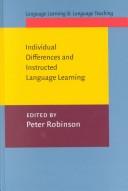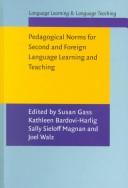| Listing 1 - 6 of 6 |
Sort by
|
Book
ISBN: 9020803050 Year: 1991 Publisher: Den Bosch Malmberg
Abstract | Keywords | Export | Availability | Bookmark
 Loading...
Loading...Choose an application
- Reference Manager
- EndNote
- RefWorks (Direct export to RefWorks)
Bevat oefeningen niveau's i.v.m. volgende aspecten: Nazeggen - Woorden vinden - Zinnen maken - Verhalen vertellen - Gesprekken voeren
Leerstoornissen. --- Schoolrijpheid. --- Taalstoornissen --- Kinderen. --- 475.2 --- taaltraining (ler) --- schoolrijpheid
Book
ISBN: 9060014022 Year: 1977 Publisher: Deventer Van Loghum Slaterus
Abstract | Keywords | Export | Availability | Bookmark
 Loading...
Loading...Choose an application
- Reference Manager
- EndNote
- RefWorks (Direct export to RefWorks)
Language Development. --- KVH-BOM --- #KVHB:Taalstoornissen; kinderen --- #KVHB:Taalontwikkeling --- #KVHB:Mentaal gehandicapten --- #KVHB:Communicatie; gehandicapten --- ontwikkelingsstoornissen --- taaltraining --- Development, Language --- Developments, Language --- Language Developments --- Psycholinguistics --- Language development. --- Language Development --- Language Acquisition --- Acquisition, Language

ISBN: 9027216983 1588112608 9027216975 1588112594 9786612161018 1282161016 9027296243 9781588112590 9781588112606 9789027296245 9781282161016 6612161019 Year: 2002 Volume: 4 Publisher: Amsterdam Philadelphia J. Benjamins Pub. Co.
Abstract | Keywords | Export | Availability | Bookmark
 Loading...
Loading...Choose an application
- Reference Manager
- EndNote
- RefWorks (Direct export to RefWorks)
This volume explores the defining element in the work of language teacher educators: language itself. The book is in two parts. The first part holds up to scrutiny concepts of language that underlie much practice in language teacher education yet too frequently remain under-examined. These include language as social institution, language as verbal practice, language as reflexive practice, language as school subject and language as medium of language learning.The chapters in the second part are written by language teacher educators working in a range of institutional contexts and on a variety of types of program including both long and short courses, both pre-service and in-service courses, and teacher education practice focusing variously on metalinguistic awareness for teachers, language improvement, and classroom communication. The unifying factor is that collectively they illuminate how language teacher educators research their practice and reflect on underlying principles.
Teacher education. Teacher's profession --- Didactics of languages --- Sociolinguistics --- Language and languages --- Language teachers --- Language awareness --- Training of --- -Language and languages --- #KVHA:Taalonderwijs --- #KVHA:Taaltraining --- Linguistic awareness --- Metalinguistic knowledge --- Awareness --- Psycholinguistics --- Foreign languages --- Languages --- Anthropology --- Communication --- Ethnology --- Information theory --- Meaning (Psychology) --- Philology --- Linguistics --- Teachers --- Language teachers - Training of --- Language and languages. --- Language awareness. --- Training of.

ISBN: 9027216940 1588112314 9027216932 1588112306 128225457X 0585462380 9027297517 9786612254574 9780585462387 9789027297518 9781282254572 9789027216939 6612254572 9789027216946 Year: 2002 Volume: 2 Publisher: Amsterdam Philadelphia, PA J. Benjamins Pub.
Abstract | Keywords | Export | Availability | Bookmark
 Loading...
Loading...Choose an application
- Reference Manager
- EndNote
- RefWorks (Direct export to RefWorks)
Second language learners differ in how successfully they adapt to, and profit from, instruction. This book aims to show that adaptation to L2 instruction, and subsequent L2 learning, is a result of the interaction between learner characteristics and learning contexts. Describing and explaining these interactions is fundamentally important to theories of instructed SLA, and for effective L2 pedagogy. This collection is the first to explore this important issue in contemporary task-based, immersion, and communicative pedagogic settings. In the first section, leading experts in individual differences research describe recent advances in theories of intelligence, L2 aptitude, motivation, anxiety and emotion, and the relationship of native language abilities to L2 learning. In the second section, these theoretical insights are applied to empirical studies of individual differences-treatment interactions in classroom learning, experimental studies of the effects of focus on form and incidental learning, and studies of naturalistic versus instructed SLA.
Didactics of languages --- Sociolinguistics --- Language and languages --- Individual differences. --- Study and teaching. --- Individual differences --- Philology & Linguistics --- Languages & Literatures --- Study and teaching --- -Individual differences --- #KVHA:Taalonderwijs --- #KVHA:Taaltraining --- Differences, Individual --- Difference (Psychology) --- Foreign languages --- Languages --- Anthropology --- Communication --- Ethnology --- Information theory --- Meaning (Psychology) --- Philology --- Linguistics --- Foreign language study --- Language and education --- Language schools --- Language and languages Study and teaching --- Language and languages - Study and teaching.
Book
ISBN: 9789062834990 Year: 2007 Publisher: Bussum Coutinho
Abstract | Keywords | Export | Availability | Bookmark
 Loading...
Loading...Choose an application
- Reference Manager
- EndNote
- RefWorks (Direct export to RefWorks)
Kinderen met taalontwikkelingsstoornissen krijgen al decennia lang veel wetenschappelijke aandacht. De behandeling van taalgestoorde kinderen door logopedisten gebeurde echter veelal intuïtief. Pas de laatste jaren is er meer wetenschappelijke belangstelling voor ontstaan.*Taaltherapie voor kinderen met taalontwikkelingsstoornissen* sluit daarop aan en biedt handvatten voor het geven van *evidence based* taaltherapie. Deze uitgave bestaat uit een boek en een cd-rom. De cd-rom bevat onder meer het computerprogramma 'Behandeldoelen taalontwikkelingsstoornissen'. Dit maakt het de logopedist makkelijk om de behandeldoelen voor taaltherapie te bepalen en om deze vervolgens uit te werken tot een behandelplan voor elk individueel kind. Het programma is toegespitst op drie soorten doelen: taaldoelen, doelen voor communicatie en participatie, en doelen in relatie met onderliggende stoornissen. In het boek licht de auteur het gebruik van het computerprogramma toe en legt zij een theoretische verantwoording af voor de behandeldoelen die daarin gebruikt worden. In het laatste deel van het boek worden behandelsuggesties gegeven voor kinderen met een taalniveau van 0 tot 6 jaar. Op de cd-rom zijn deze uitwerkt in de vorm van concrete thema's, scripts met afbeeldingen en liedjes, woordenlijsten, en een stappenplan voor taaltherapie met prentenboeken. Taaltherapie voor kinderen met taalontwikkelingsstoornissen stelt ervaren logopedisten en logopediestudenten in staat om op een eenvoudige manier een goed gefundeerd behandelplan te ontwikkelen. Deze uitgave bestaat uit een boek en een cd-rom. De cd-rom bevat onder meer het computerprogramma 'Behandeldoelen taalontwikkelingsstoornissen'. Dit maakt het de logopedist makkelijk om de behandeldoelen voor taaltherapie te bepalen en om deze vervolgens uit te werken tot een behandelplan voor elk individueel kind. Het programma is toegespitst op drie soorten doelen: taaldoelen, doelen voor communicatie en participatie, en doelen in relatie met onderliggende stoornissen. In het boek licht de auteur het gebruik van het computerprogramma toe en legt zij een theoretische verantwoording af voor de behandeldoelen die daarin gebruikt worden. In het laatste deel van het boek worden behandelsuggesties gegeven voor kinderen met een taalniveau van 0 tot 6 jaar. Op de cd-rom zijn deze uitwerkt in de vorm van concrete thema's, scripts met afbeeldingen en liedjes, woordenlijsten, en een stappenplan voor taaltherapie met prentenboeken.
Taalstoornissen ; kinderen. --- kleuters --- taalverwerving --- Orthopedagogics --- Kindergarten --- peuters --- taalstoornissen --- #KVHB:Taaltherapie --- #KVHB:Taalstoornissen; kinderen --- taalontwikkelingsstoornissen --- taaltherapie --- Contains audio-visual material --- Taalontwikkeling --- Taalproblemen --- 463.4 --- Spraak- en taalgebrekkigen --- Kinderen --- Spraakproblemen --- Taaltherapie --- Linguïstiek --- Taalvaardigheid --- Taalverwerving --- Taalontwikkelingsstoornissen --- Cursus bachelor in de Logopedie --- ontwikkelingsstoornissen --- 803.3 --- taalontwikkelingsstoornissen (ler) --- taaltraining (ler) --- Cursus bachelor in de Logopedie en de Audiologie --- Kind --- Taalprobleem --- Spraakprobleem --- Taal --- Jeugd --- Media --- Ontwikkelingsstoornis --- Fysiotherapie --- Therapie --- Taalontwikkelingsstoornis --- Bachelor in de logopedie en de audiologie

ISSN: 15699471 ISBN: 9027216991 9027217009 1588112624 1588112616 9786612161957 1282161954 9027297495 9781588112620 9789027297495 9781588112613 9781282161955 6612161957 Year: 2002 Volume: 5 Publisher: Amsterdam Philadelphia J. Benjamins Pub. Co.
Abstract | Keywords | Export | Availability | Bookmark
 Loading...
Loading...Choose an application
- Reference Manager
- EndNote
- RefWorks (Direct export to RefWorks)
The concept of Pedagogical Norm is grounded in both sociolinguistic and psycholinguistic principles. Pedagogical norms guide the selection and sequencing of target language features for language teaching and learning. This book both situates and expands on this concept highlighting the interaction of research and pedagogy. The papers collectively illustrate how the concept of pedagogical norm applies to all components of language, including phonology, morphology, syntax, and discourse. The book begins with a discussion of definitions including papers that trace the history of the concept and define what is meant by norms. Also included are papers that apply the concept of pedagogical norms in specific contexts (e.g., intonation, morphology) and to specific languages. Finally, pedagogical norms are extended beyond the more traditional areas of grammatical competence to such disparate areas as listening, discourse, and circumlocution.
#KVHA:Taaltraining --- Valdman, Albert --- Language and languages --- -Education --- -#KVHA:Taalonderwijs --- #KVHA:Taaldidactiek --- Children --- Education, Primitive --- Education of children --- Human resource development --- Instruction --- Pedagogy --- Schooling --- Students --- Youth --- Foreign languages --- Languages --- Study and teaching --- Standards --- Education --- Civilization --- Learning and scholarship --- Mental discipline --- Schools --- Teaching --- Training --- Anthropology --- Communication --- Ethnology --- Information theory --- Meaning (Psychology) --- Philology --- Linguistics --- Didactics of languages --- Sociolinguistics --- Langage et langues --- Etude et enseignement --- Normes --- Language and languages - Study and teaching --- Education - Standards --- Standards and standardization in education --- Standards-based education --- Language and languages Study and teaching --- Language and education --- Language schools --- Study and teaching. --- Standards. --- -Study and teaching
| Listing 1 - 6 of 6 |
Sort by
|

 Search
Search Feedback
Feedback About UniCat
About UniCat  Help
Help News
News